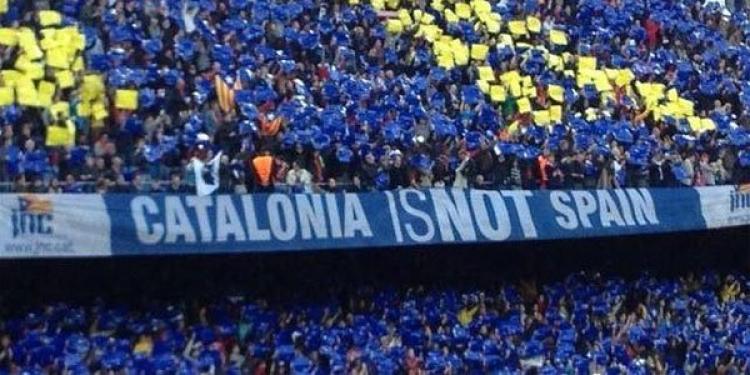What Happens to National Football in Case of a Catalonia Split from Spain?
Posted: September 25, 2015
Updated: October 6, 2017

A possible Catalonia split from Spain would not be a unique case in the world of football, however it would surely create some unpleasant situations.
The Spanish national football team is among the favorites for EURO 2016 title according to online sportsbooks in EU. However, should Catalonia split from Spain, the odds would be upset immediately. In addition, several interesting questions arise thanks to the possibility of this occurrence. GamingZion aimed to collect the most recent country splits and brought their experiences as examples for what could be waiting for the future of Spanish as well as Catalan football.
Yugoslavia split into 5 national teams during the 1990s

Yugoslavia was made up of 6 republics and an autonomous region, Kosovo. The country started splitting up one by one from the 1990s.
Croatia and Slovenia opened the line in June 1991, when they both declared independence.
They were followed by Macedonia in September and by Bosnia &Herzegovina in March 1992.
All this happened slightly before the beginning of the 1992 European Championship, for which Yugoslavia qualified as group winner.
However, the UN punished them by banning Yugoslavia from the EURO 1992 for which they were going to be one of the favourites. (Short note: Denmark replaced them and won the competition.)

The independent nations were regarded as entirely new countries by FIFA and UEFA, while Serbia and Montenegro were regarded as the successor of Yugoslavia – they were even called Federal Republic of Yugoslavia until 2003.
Serbia and Montenegro split up shortly before the 2006 World Cup
Federal Republic of Yugoslavia switched name to Serbia and Montenegro in 2003, however this marriage did not last too long either. The 2 remaining bastions of Yugoslavia successfully qualified for the 2006 FIFA World Cup. However, few weeks before the tournament started, Montenegro declared its independence, which meant that they were running as two different nations as soon as the tournament was over. However, they participated together for the trophy.
Many people were happy to be able to live in an independent country, although many became frustrated as well due to the new world order. Serbia and Montenegro were unable to make an agreement about dual citizenship, so many Montenegrins living in Serbia were forced to feel like a foreigner, even if they spent most their lives in the country.
Czechoslovakia split up in the middle of the 1994 World Cup Qualifications
The Dissolution of Czechoslovakia happened as of 1 January, 1993. Czechoslovakia was on the right path to qualify for the 1994 FIFA World Cup finals. They were among the candidates to be able to qualify for the tournament, however the split of the nation became a burden for them. They had to find the quickest way to handle the problem on how they could finish the qualification stage.

The solution was that the two teams participated in the event together. Of course, their name was not Czechoslovakia any longer. They aimed to reach World Cup qualification under the name “RCS”, which was the abbreviation for “Representation of Czechs and Slovaks. After they failed to defeat Belgium in the last round and hence failing to qualify for the World Cup, they started participating separately and became each other’s great rivals.
Czechoslovakia’s example predicts cooperation between the countries if Catalonia split from Spain really occurs
Players chose their national teams according to their passports and citizenships, which depended on their place of birth. In this sense, Slovaks were a bit less needy: they allowed dual citizenship at first. However, those who wanted to gain Czech citizenship, they had to give up on their Slovak citizenship.
Should the same thing happen after a proposed Catalonia split from Spain, we would be able to enjoy the strongest Spanish team at EURO 2016.They would have high chances of becoming EURO 2016 winners according to online gambling sites in EU as their squads would be among the best ones in the tournament. They would run under the name of RCS just like the Czechoslovaks did, but it would stand for “Representation of Catalans and Spaniards.” And after the European Championship, we would be able to watch the two countries fight separately. Each player according to their (old or new) citizenships.
Spanish politicians and the European Unionare against Catalan independency

Spaniards are obviously not so keen on giving up on their richest autonomous community. The foreign minister of Spain said that if Catalans become independent, they should not even dream about being allowed to retain their Spanish citizenship. And even though some believe that the minister is only bluffing, in politics, well, you never know.
Jean-Claude Juncker, President of the European Commission, has also declared that Catalonia would not be member of the European Union upon becoming independent from Spain. They would have to apply first, and the process might take years. Viviane Reding, vice president of the European Commission said the same about a possible Catalan independence back in February 2015, so the European Union seems to have a common view about the subject.
A Catalonia split from Spain would lead to greater issues
The most important things in connection with the possible occurrence will be decided by the Spanish and the Catalan nation, and their governments. Of course, both sides keep saying their own version of truth and none of them seems to be capable of making any kind of compromise. Catalans want independence in their own country with their own national football team, and they might even have it soon.

However, that does not seem too profitable for any of the sides in addition to giving sources to many issues. According to FIFA and UEFA rules, a footballer cannot represent 2 national teams – if you played an official game for a country, you’re theirs for ever. Who would those Catalans, like Piqué or Fabregas, play for upon the Catalan independence occurs? Will Spanish citizenship be taken away from Catalans or will dual-citizenship be allowed? And another important question, will Barcelona be able to play in the Spanish league after the split? Internet betting sites are dying to find this out…












